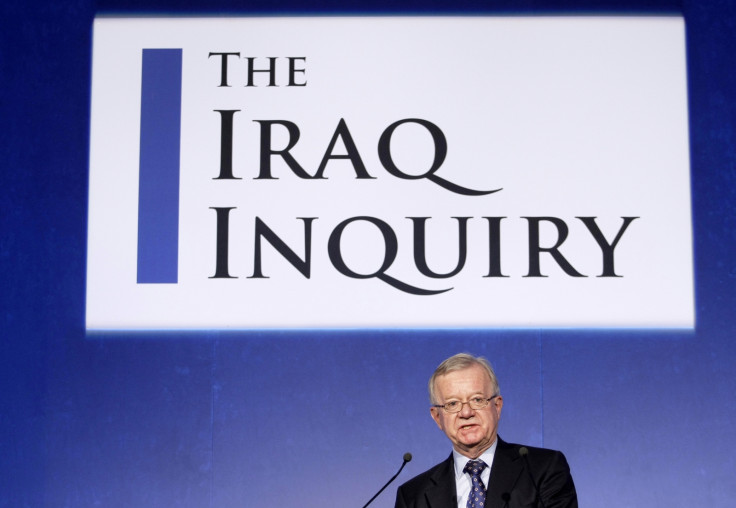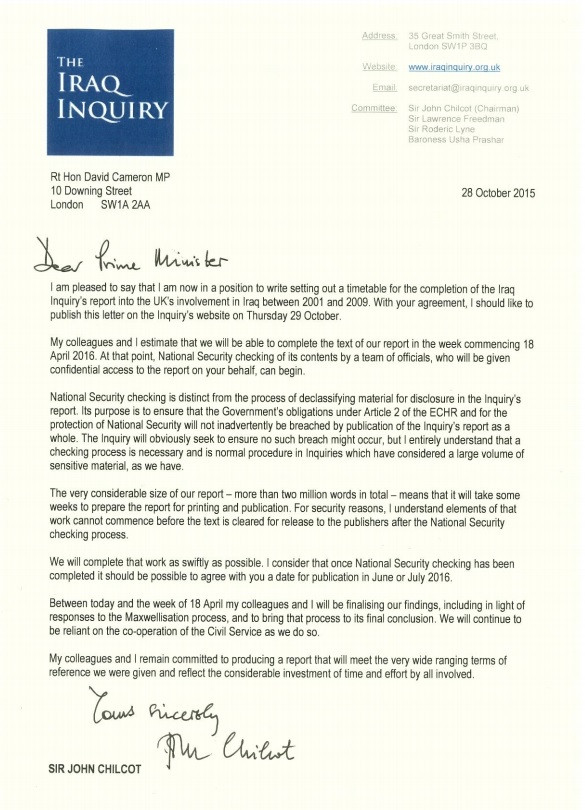Chilcot report: Iraq Inquiry to be published in June or July 2016 ending seven-year wait

Sir John Chilcot has written to David Cameron to say the Iraq Inquiry will be published in the summer of 2016. The chairman of the public inquiry wrote to the prime minister on 28 October to inform him the report will be ready for publication in either June or July.
In his letter, Chilcot said: "My colleagues and I estimate that we will be able to complete the text of our report in the week commencing 18 April 2016. At the point, National Security checking of its contents by a team of officials, who will be given confidential access to the report on your behalf, can begin." He added the "considerable size" of the report, which has more than two million words, means it will take time to prepare the report for printing.
The timetable will end the wait for a publication date after Gordon Brown, the prime minister at the time, commissioned the public inquiry in July 2009. Its aim was to look at the build-up and aftermath of the Iraq war as well as the conflict itself - a period lasting from the summer of 2001 to the end of July 2009.
Will the publication of the #Chilcot report end the #Iraq war debate?
https://t.co/naepL7SPty
— IBTimes UK (@IBTimesUK) October 29, 2015Prime Minister David Cameron wrote back to Chilcot saying he and the families of those who served in Iraq was "disappointed" the inquiry did not find it "possible logistically" to report before the summer but suggested the report could arrive earlier than June or July.
In his letter to Cameron, Chilcot said the text would be ready by the week commencing 18 April when it would then be screened by National Security, a process he said would take "some weeks" before going to the printers.
But Cameron, who earlier this year said the British public was "fast losing patience" with the report, said the report might not take that long to check. "In relation to the National Security checking, the Government will aim to complete the process as quickly as possible. As you know, National Security checking for the Savile Inquiry took two weeks to complete. It would certainly be our plan and expectation to take no longer than this, and we will look to complete the process more quickly."
The office of ex-PM Tony Blair released a statement denying criticism he was responsible for delaying the report. "Tony Blair received the deliberations of the inquiry under the Maxwell process in full only in January 2015, four years after the inquiry finished taking evidence. He responded by August. This is not therefore the reason for the delay as Sir John Chilcot has made clear."
"Lessons to be learned"
In its opening statement the inquiry outlined it would look to establish "the way decisions were made and actions taken" and to establish "what happened and to identify the lessons that can be learned."
In total the panel sat in on 130 sessions of witness evidence and received more than 150,000 documents. As well as Brown, those who gave evidence included former prime minister Tony Blair - who was questioned twice - and Labour's former communication's chief Alastair Campbell as well as Sir Christopher Meyer, the former ambassador to the United States.
Military figures who gave evidence included Admiral Lord Boyce, former Chief of the Defence Staff; Sir John Scarlett, Chief of the Secret Intelligence Service; Major-General Tim Cross and Air Chief Marshall Sir Brian Burridge.
Chilcot was criticised by politicians and armed forces' family members for delaying the report, which is estimated to have cost the British taxpayer £9m. But the chairman defended the right for every individual criticised in the report to be given the opportunity to respond in a legal process known as "Maxwellisation".

© Copyright IBTimes 2025. All rights reserved.






















